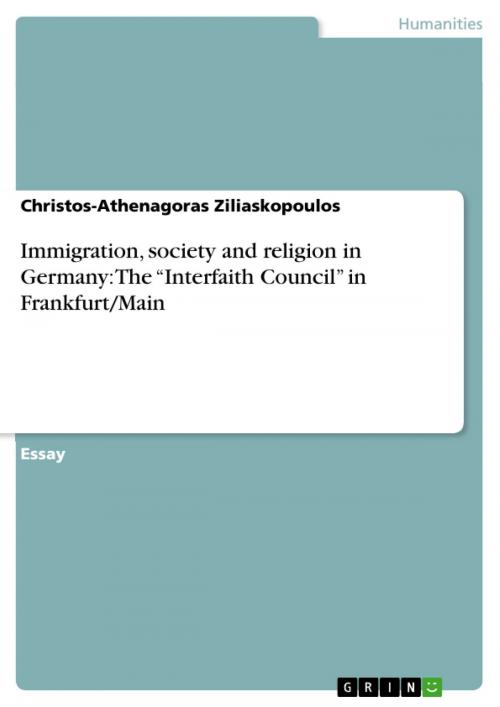Immigration, society and religion in Germany: The 'Interfaith Council' in Frankfurt/Main
Nonfiction, Social & Cultural Studies, Social Science, Sociology, Marriage & Family| Author: | Christos-Athenagoras Ziliaskopoulos | ISBN: | 9783656187073 |
| Publisher: | GRIN Verlag | Publication: | May 9, 2012 |
| Imprint: | GRIN Verlag | Language: | English |
| Author: | Christos-Athenagoras Ziliaskopoulos |
| ISBN: | 9783656187073 |
| Publisher: | GRIN Verlag |
| Publication: | May 9, 2012 |
| Imprint: | GRIN Verlag |
| Language: | English |
Essay from the year 2012 in the subject Sociology - Religion, , language: English, abstract: It is only after 1960´s immigration has been framed negatively by Western European countries. A brief answer to the question why the view towards the immigrants changed in 1960´s could be the dissolution of the Eastern Block which caused enormous demographic changes which had as a consequence serious impact on socioeconomic level. The mobilization of a great mass of people lead European national states to ethnicise their migration policies in a way that encourage the arrival of immigrants from the simiral ethnic background, in order to achieve, a re-homogenization in the Post- Communist era. Immigrants of different cultural background rather that the majority´s were disapproved. Specifically, on the German example, immigration inflow was considered a necessity for the rebuilt of a dilapidated Germany. Germany failed on the re-patriation process of the 'guest process' which ended being permanent residents in the host country. It is a considerably recent attempt for the German national authorities to move integration to a policy concern and establish a new civil and social identidy for all citizens. Religious and cultural identidy are most then ever important in postmodern history of Germany. Frankfurt's Interfaith Council (Rat der Religionen) , created on April 1. 2009, acts cooperatively with the local authorities of the city of Frankfurt. The purpose of the Council is the promotion of religion by the dialogue between them.
Essay from the year 2012 in the subject Sociology - Religion, , language: English, abstract: It is only after 1960´s immigration has been framed negatively by Western European countries. A brief answer to the question why the view towards the immigrants changed in 1960´s could be the dissolution of the Eastern Block which caused enormous demographic changes which had as a consequence serious impact on socioeconomic level. The mobilization of a great mass of people lead European national states to ethnicise their migration policies in a way that encourage the arrival of immigrants from the simiral ethnic background, in order to achieve, a re-homogenization in the Post- Communist era. Immigrants of different cultural background rather that the majority´s were disapproved. Specifically, on the German example, immigration inflow was considered a necessity for the rebuilt of a dilapidated Germany. Germany failed on the re-patriation process of the 'guest process' which ended being permanent residents in the host country. It is a considerably recent attempt for the German national authorities to move integration to a policy concern and establish a new civil and social identidy for all citizens. Religious and cultural identidy are most then ever important in postmodern history of Germany. Frankfurt's Interfaith Council (Rat der Religionen) , created on April 1. 2009, acts cooperatively with the local authorities of the city of Frankfurt. The purpose of the Council is the promotion of religion by the dialogue between them.















